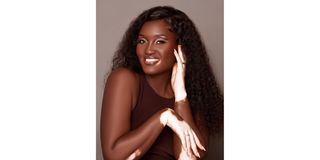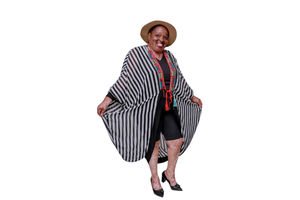
Cerinah Tugume, CEO of Serene Beauty.
At the age of 10, Cerinah Tugume, the CEO of Serene Beauty, faced the difficulties associated with this significant change in her appearance. It was from her own experience that she developed a passion for the make-up world.
Since the children in her primary school knew her well, she did not find it difficult to complete her primary education. The challenge came when she transitioned to secondary school.
“When you have a condition such as vitiligo, the people around you get used to it, and you become comfortable. But, when you change communities, you have to deal anew with challenges such as stigma and unwelcome comments, such as being told, ‘You were burnt by twins’. Fortunately, I was a day scholar, and my mother would receive me daily, offering a place to process my struggles,” Tugume recalls.
Early challenges
Having a supportive family and friends gave her peace of mind since the condition does not cause physical pain. When she was about 16 years old, she joined a different school for A-Level. Her mother’s friend gave her make-up to conceal her vitiligo, which was prominent on her face and mild on her hands and elbows, to help her adjust to the new school community.
“A friend of my mother gave me make-up and taught me how to use it. On school days, I would wake up early and spend about an hour concealing my vitiligo. Fortunately, the make-up was good enough, and I did not need a touch-up during the day, even when we went swimming at school once a week,” Tugume says.
The turning point
Between her late teens and early 20s, she experienced a season of emotional healing that liberated her. Her relationship with God and other significant relationships in her life played a crucial role in offering healing, comfort, and courage. She grew to believe that something beautiful can come out of any negative experience.
“As I progressed on my emotional healing journey, she recalls, “I started to redefine who I am and blocked out the outside noise. This is how I started Serene Beauty, a bridal hair and make-up studio. I perfected my make-up skills and also sought to support and counsel people with vitiligo, advising them on suitable make-up products and application techniques.”
Some people with vitiligo may live peacefully without stigma because their society is educated about the condition. In Uganda, however, this is the minority, according to Tugume. Many people with vitiligo face myths and careless comments about their condition, making it even more difficult to live with. She sometimes faces backlash from people who demonise make-up, saying it hides the vitiligo.
“I believe every woman is free to wear make-up if they choose to. It is not that those people have not accepted vitiligo, but they want to have a normal day without explaining their condition to everyone they meet, especially strangers. We seek a peaceful environment free from insults or stigma. This is why I started doing my make-up and that of others with the condition,” she added.
Her five-year-old son believes everyone with vitiligo is her mother’s sibling. Tugume remarks that with the education she has provided her children about the condition, she does not have to explain why her skin is different. She feels she is contributing to educating the next generation.
“One day, I overheard my son explaining vitiligo to another child. My heart melted with joy. He also said, ‘It is prettyligo because it makes you pretty.’
Raising awareness
Some people with vitiligo may live peacefully without stigma because their community is educated about the condition. In Uganda, however, this is the minority, according to Tugume.

Cerinah Tugume, CEO of Serene Beauty. PHOTO | BEATRICE NAKIBUUKA
Many people with vitiligo face myths and careless comments about their condition, making it even more difficult to live with. She found peace wearing make-up even as she pursued her treatment options, which have been to some degree successful on her face.
“Make-up can help a person with vitiligo have a normal day without having to explain their condition to everyone they meet, especially strangers,” she added. In Uganda, the culture around people with this condition is often disrespectful and overly intrusive. Tugume emphasises that increasing awareness about vitiligo will help change the narrative in the years to come, helping people with vitiligo bear the condition.
Understanding vitiligo
Vitiligo is an acquired autoimmune skin disorder that is unpredictable and can affect anyone, regardless of age, race, background, or sex, according to Dr Malik Ssempereza, a dermatologist at Unity Skin Clinic.
The condition destroys skin pigmentation and can affect any part of the skin or body. It is not contagious and does not spread by touch but can be triggered and worsened by stress.
“The body’s immune system sometimes affects the cells that produce skin colour, called melanocytes, which form melanin. You can suddenly develop a white patch on your skin or see it develop over time as new patches appear in other areas. No one knows why vitiligo affects people, but for some, it can be triggered by stress,” Dr Ssempereza says.
Vitiligo is one of the skin diseases that can be triggered, worsened, or increased by stress. The more you get stressed, the more you lose colour. The pattern of colour loss varies. Some people get it on body openings like the eyes, mouth, nose, and ears, while others have it on their hands, legs, or all over their body.
The affected skin areas are harmless. They do not itch, swell, bleed, or develop wounds. For most people, the more stressed they become, the more it affects them.
There is no known cure for vitiligo, but treatment with phototherapy may help re-pigment parts of the skin. Treatment is not compulsory and should be decided by the person with vitiligo if they can afford it.
Dr Ssempereza recommends seeing a dermatologist to confirm if it is vitiligo, since other conditions can look similar to it.
The more stressed one becomes, the more vitiligo affects them. So, it is important for people around them to help them understand and cope with the condition.
He advises people with vitiligo to use good quality make-up products to provide satisfaction and peace of mind as they cope with the condition.
“Clothes do not affect vitiligo, but covering up your skin too much denies sun exposure, which can worsen the condition. Sun exposure helps in repigmentation, so exposing your skin to the morning sun is very beneficial,” he says.
Skincare and make-up tips
Vitiligo often creates patches and uneven skin tones. Techniques and products such as foundation and concealer help camouflage and blend patches with the surrounding skin, creating a more uniform appearance.
Dr Ssempereza emphasises that vitiligo is painless and should not cause worry about any underlying medical condition. Like anyone else, people with vitiligo need a good skincare routine that includes sunscreen and moisturiser. Care should be given to one’s emotional and psychological well-being to ensure a healthy life with vitiligo.
There is nothing wrong with wearing make-up when you have vitiligo, especially if it helps you feel comfortable. People with vitiligo are not being urged to wear make-up, but it can be beneficial in certain situations.
Tugume recommends good quality, full-coverage foundations and concealers rather than light or medium coverage ones. You will need products including foundation, moisturizer, sunscreen, lipstick, mascara, and concealers. Cream-based products are recommended over liquid ones because they have better-staying power.
“I usually advise people to buy good quality, long-wear make-up that lasts through the day so they do not feel awkward before the day ends. Non-oily make-up is also recommended, but the most important point is the technique used to apply the make-up. This make-up routine should take less than 15 minutes before going out to work,” Tugume says.
It is important for people with vitiligo to wear sunscreen, whether they wear make-up or not. Sunscreen with SPF 50 and above protects the skin from sunburn. If you are wearing make-up, apply the sunscreen under the foundation and remember not to sleep in your make-up.




